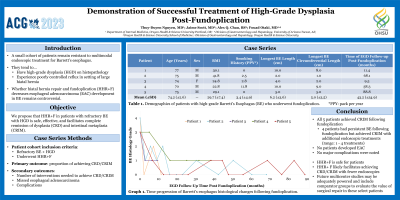Monday Poster Session
Category: Esophagus
P1871 - Demonstration of Successful Treatment of High-Grade Dysplasia Post-Fundoplication
Monday, October 23, 2023
10:30 AM - 4:15 PM PT
Location: Exhibit Hall

Has Audio

Thuy-Duyen Nguyen, MD
Oregon Health & Science University
Portland, OR
Presenting Author(s)
Thuy-Duyen Nguyen, MD, Jaime Scott, MD, Alex Q. Chau, BS, Fouad Otaki, MD
Oregon Health & Science University, Portland, OR
Introduction: Multimodal endoscopic treatment continues to be an effective and durable treatment of Barrett's esophagus (BE). There remains a small cohort of patients who remain resistant to treatment. These often have high-grade dysplasia (HGD) on histopathology and poorly controlled reflux in the setting of a large hiatal hernia. Current studies assessing whether a hiatal hernia repair and fundoplication (HHR+F) decreases esophageal adenocarcinoma (EAC) development in BE remain controversial. We propose that HHR+F in patients with refractory BE with HGD is safe, effective, and facilitates complete remission of dysplasia (CRD) and intestinal metaplasia (CRIM).
Case Description/Methods: In this study, we evaluated a cohort of patients with refractory BE with HGD who underwent HHR+F. The primary outcome was the proportion of achieving CRD/CRIM. The secondary outcomes assessed were the number of interventions needed to achieve CRD/CRIM, missed cancer risk, and complications. Within a large cohort of patients undergoing multimodal endoscopic therapy in a tertiary academic center, we identified five patients with BE HGD on maximal antisecretory therapy and who underwent fundoplication. Of these patients, one was female, and the mean BMI was 29.7. Three patients had a smoking history. The mean maximum BE length was 6.2 cm. Four patients demonstrated persistent BE following fundoplication, but all four achieved CRIM with additional endoscopic treatment after fundoplication. No patients developed EAC, and no major complications were noted.
Discussion: HHR+F is safe in patients with BE HGD and likely facilitates the achievement of CRIM/CRD with fewer endoscopies. Future multicenter studies may be adequately powered and include comparator groups to further evaluate the value of surgical repair in this select cohort of patients.

Disclosures:
Thuy-Duyen Nguyen, MD, Jaime Scott, MD, Alex Q. Chau, BS, Fouad Otaki, MD. P1871 - Demonstration of Successful Treatment of High-Grade Dysplasia Post-Fundoplication, ACG 2023 Annual Scientific Meeting Abstracts. Vancouver, BC, Canada: American College of Gastroenterology.
Oregon Health & Science University, Portland, OR
Introduction: Multimodal endoscopic treatment continues to be an effective and durable treatment of Barrett's esophagus (BE). There remains a small cohort of patients who remain resistant to treatment. These often have high-grade dysplasia (HGD) on histopathology and poorly controlled reflux in the setting of a large hiatal hernia. Current studies assessing whether a hiatal hernia repair and fundoplication (HHR+F) decreases esophageal adenocarcinoma (EAC) development in BE remain controversial. We propose that HHR+F in patients with refractory BE with HGD is safe, effective, and facilitates complete remission of dysplasia (CRD) and intestinal metaplasia (CRIM).
Case Description/Methods: In this study, we evaluated a cohort of patients with refractory BE with HGD who underwent HHR+F. The primary outcome was the proportion of achieving CRD/CRIM. The secondary outcomes assessed were the number of interventions needed to achieve CRD/CRIM, missed cancer risk, and complications. Within a large cohort of patients undergoing multimodal endoscopic therapy in a tertiary academic center, we identified five patients with BE HGD on maximal antisecretory therapy and who underwent fundoplication. Of these patients, one was female, and the mean BMI was 29.7. Three patients had a smoking history. The mean maximum BE length was 6.2 cm. Four patients demonstrated persistent BE following fundoplication, but all four achieved CRIM with additional endoscopic treatment after fundoplication. No patients developed EAC, and no major complications were noted.
Discussion: HHR+F is safe in patients with BE HGD and likely facilitates the achievement of CRIM/CRD with fewer endoscopies. Future multicenter studies may be adequately powered and include comparator groups to further evaluate the value of surgical repair in this select cohort of patients.

Figure: Time progression of Barrett's esophagus histological changes following fundoplication. All five patients demonstrate histological improvement from initial high-grade dysplasia grades 3 and 4 to non-dysplastic grades 0 and 1.
Disclosures:
Thuy-Duyen Nguyen indicated no relevant financial relationships.
Jaime Scott indicated no relevant financial relationships.
Alex Chau indicated no relevant financial relationships.
Fouad Otaki indicated no relevant financial relationships.
Thuy-Duyen Nguyen, MD, Jaime Scott, MD, Alex Q. Chau, BS, Fouad Otaki, MD. P1871 - Demonstration of Successful Treatment of High-Grade Dysplasia Post-Fundoplication, ACG 2023 Annual Scientific Meeting Abstracts. Vancouver, BC, Canada: American College of Gastroenterology.
